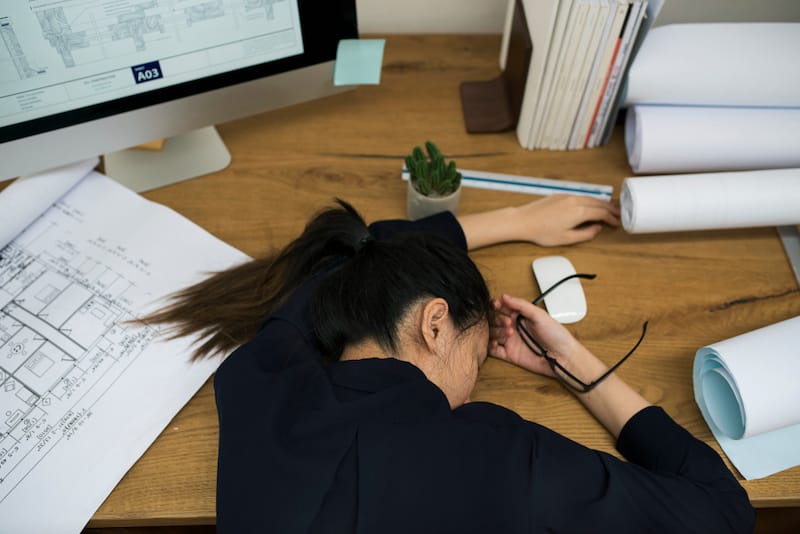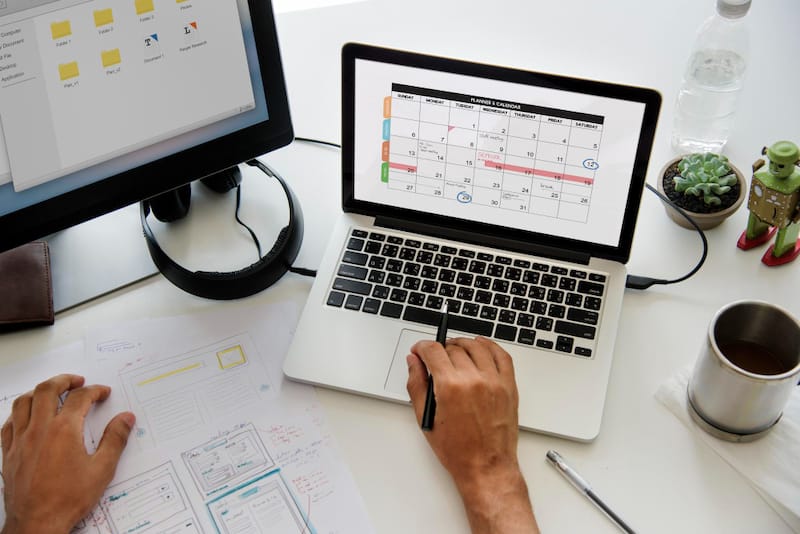Anxiety from work can stem from various places, such as a toxic work environment, lack of support from managers, long working hours, and losing personal relationships, to name a few. Anxiety symptoms generated from work could also be physical and impact your productivity immensely. However, recognizing where these feelings stem from can help you deal with the situation better. A few ways, such as adopting a healthy lifestyle, journaling, meditating, being organized, openly communicating, setting work boundaries, and taking meaningful breaks, can help reduce anxiety. Mental health conditions shouldn’t be taken lightly, and seeking professional help is always encouraged.
Have you ever experienced this tightening feeling in your chest before you begin your work?
Or this feeling that your heart is racing a mile, and you feel jittery like you’re high on caffeine before beginning work?
Workplace anxiety is a pretty common thing for working individuals to face.
As a working individual, there were times when I faced this particular anxiety, and the feeling mentioned above is how I could describe it best.
It’s nothing to be ashamed of, but then you start to wonder if I am the only one going through it and how I can make it go away or feel better while working.
Though there’s no sure way of dealing with anxiety as a whole, there’re different ways each person can learn to deal with it.
Is workplace anxiety real?
Before jumping into the reasons and learning how to deal with this type of anxiety, it’s imperative you know that all of this is real.
Anxiety is real, and it can be different for each person.
For some, it could even be presented as physical symptoms such as headaches, stomach pain, trouble sleeping, and feeling of isolation and irritation.
While each person faces some anxiety in their life from time to time which is essential in increasing our work productivity, it could be a disorder if it’s persistent, uncontrollable, and overwhelming.
According to the Anxiety & Depression Association of America, national prevalence data indicates that nearly 40 million people in the United States (18%) experience an anxiety disorder in any given year.
From personal experience, the anxiety I felt was at random times when I would feel this overwhelming sensation in my chest to the point where I would start crying or sobbing.
It would feel like things were falling apart, and I couldn’t handle anything anymore. I wanted to give up everything and curl into a ball in my safe space.
When you feel this existential dread related to work, and this crippling sensation of hating work to the point where you don’t want to go anymore, then it’s problematic.
How to recognize work anxiety?

Most of the anxiety symptoms you feel from work are similar to generalized anxiety disorder.
Though the reasons are work-related, the symptoms are pretty common:
- Excessive or irrational worrying
- Trouble falling asleep or staying asleep
- Exaggerated startle reaction
- Feeling jittery
- Tiredness or fatigue
- Feeling like there’s a lump in your throat
- Shaking or trembling
- Dry mouth
- Sweating
- A pounding /racing heart
- Missing a lot of days of work and not caring about it
- Struggling to concentrate on any work task, be it small or big
- Focusing too much on negative aspects of the job
- Overreacting to situations on the job
What causes work anxiety?
It’s mainly caused by the work environment, which includes the type and kind of work a person does, their co-workers, and their manager/supervisor.
Any of the following reasons can induce the symptoms of anxiety:
At a particular time of the day
Sometimes, the time of the day is of particular importance to a working individual. While some work well under high pressure at night, others might do well in the morning.
People who are pressured to complete a deadline in the morning or have morning meetings while they function better at night might start feeling anxiety in the long term.
No work-life balance
Be it any job, including a desk or a manual job, getting time for your personal life is much needed in today’s time.

When everything is so stressful meaningful breaks are needed to spend time on your hobbies and with loved ones.
This takes off the burden and reduces the stress accumulated over the week.
When there’s no work-life balance and work is so hectic that you have to work late during the week and your job requires you to be present during the weekend, developing anxiety is not something to get surprised over.
Lack of support from managers/supervisors
They say that an understanding boss can make your stressful job bearable.
An understanding manager or supervisor can be truly helpful in managing subordinates and knowing when to ease the workload.
They are a manager for a reason, and knowing the strengths and weaknesses of their subordinates is the way to increase work productivity while ensuring employees’ mental health and wellness.
Toxic work environment

This can include everything from uncooperative co-workers to non-flexible managers and the harsh nature of the job.
It could be the company policy which you can find toxic, or the people on the job with you making the whole environment toxic.
Workplace bullying or conflicts can make the environment toxic inducing anxiety.
Losing personal relationships
Sometimes we get so involved in our work that it impacts our personal relationships and ends up severing or complicating them.
Then one day, we might wake up from the work comma and realize how these relationships have deteriorated, which could induce anxiety.
It could also be the nature of your work, which doesn’t give you enough time to bond with your loved ones.
Long working hours
In November 2022, the average working week for all employees on private nonfarm payrolls in the United States was 34.4 hours.
But if you find yourself working longer hours during the week and then contributing to work during the weekend, it can be problematic for your mental health in the long run.
When there’s not enough time to relax, it can develop work-related anxiety in us.
Tight deadline-driven environment
Some workplaces are too demanding of their employees.
Take, for example, the media industry, which might require employees to work for non-fixable hours during the week and then be available to answer even during the weekend.
These workplaces leave little to no free or individual time for their employees and require constant input, affecting their mental health to an extreme point.
Being constantly on guard to the point where you can’t even separate from your phone for half an hour is something to reflect on, as it could be just the cause of your work anxiety.
How to cope with work anxiety?
Instead of panicking about things you can’t control, do what you can.
This includes making yourself aware of your issues and making a conscious effort to handle your mental health.
Though easier said than done, there’re ways to reduce your work anxiety:
1. Adopting healthy habits
They said habits could make or break a person.
So, when you dedicate time to things and adopt a healthy lifestyle from eating and drinking healthy with daily exercising, your body will automatically start feeling a bit better.
By eating and drinking healthy and topping it with the movement of your body regularly, your body will produce enough happy hormones and find a way to release tension and pent-up anger.
Also, try not to see your phone, especially avoid social media pressure, as soon as you wake up.
2. Be organized

Make a schedule and one that works for you. Though you can find different routines on online platforms, don’t be intimidated by them. Instead, find one that works well for your body and mental well-being.
It also includes keeping things clean around you. Start by folding your sheets when you get up in the morning and see the change that follows from that one productive act.
3. Moving your body
Be it some form of sport, dance, aerobics, or even walking for half an hour, it can do wonders for your body.
Regular exercise gives you time to recollect your thoughts and refreshes your mind while making your body spend your energy building up your stamina.
4. Meditate or do yoga
Some people find calming movements best to relax their minds and reduce anxiety. For that, meditating and doing yoga is the best way.
5. Journal
If you have never journaled, it might feel stupid at first, but after a few days, you’ll find this cathartic.
When we write down words, we somehow realize where these feelings of anxiety stem from.
Other times we find the issue, which was too much for us to handle, was, in fact, nothing, and the solution was right in front of us.
This can help you recognize your issues, where your anxiety stems from, and maybe even how to deal with it.
6. Communicate
Other people find talking to their loved ones much more helpful than writing it down on paper.
Be it your family member or a friend, talking has its charm, which can help us vent, find solutions and find solace.
You could even go to a professional like a therapist and communicate your troubles to them.
7. Celebrate small successes
When you celebrate small victories, you reward yourself, and as a human, we love getting appreciated for our efforts, however small.

If there was a big presentation you have been preparing and fussing about for a long time and you did well, you should treat yourself to your favorite dessert or do something fun at an amusement park if that’s your thing.
8. Prepare and plan
When there’s a big work thing, it’s better to prepare for it in advance so that even the more minor issues can be dealt with easily. This can reduce your anxiety over a big project.
9. Set some boundaries
You could find setting boundaries a difficult thing to do, but in doing so, you’re ensuring your mental well-being for the long term.
It doesn’t mean you have to be rude, but you can handle a situation calmly and politely.
If a co-worker wishes to vent to you, politely telling them that you don’t have the mental capacity for it today is a respectful way to deal with things.
10. Steer clear of toxicity
If you find a group of co-workers are all about gossiping, other than maintaining a cordial work relationship, you don’t necessarily have to engage with them after working hours.
You should also consider changing your job if the situation is too much.
11. Taking small meaningful breaks
If you’re facing a stressful work month, even smaller breaks can be made meaningful.
For example, instead of using social media that month, invest your time in reading a book, taking a walk, listening to music, or catching up with a friend over a cup of coffee.
FAQs
Is it normal to have work anxiety when you start working?
It’s pretty normal to feel anxiety at various points in our life. Feeling a small amount of anxiety before you start working is expected as we aren’t familiar with the new environment, which can make us feel a bit anxious.
You might even feel workplace anxiety from time to time. It’s essential to differentiate normal anxiety from an anxiety disorder.
Should I quit my job due to anxiety?
Before quitting your job, you should consider several factors. If your job is high-stress, tight deadline driven, leaves you little to no personal time, has a toxic environment, and has a non-flexible manager, then it’s right to think about quitting.
Sometimes, people also change their career path to one which is less demanding and is easier going. So consider everything before giving in your notice.
How do you tell your boss you’re struggling mentally?
It’s important to notice here that your boss needs to be an understanding person with whom you have some comfort and cordial relationship before opening up.
If you find them not taking mental health seriously, you could get more hurt by being vulnerable in front of them.
But if you think opening up can help you, then make sure you sit down and chat about it over a long break when work is less so you can discuss your mental health issues without them getting distracted.


